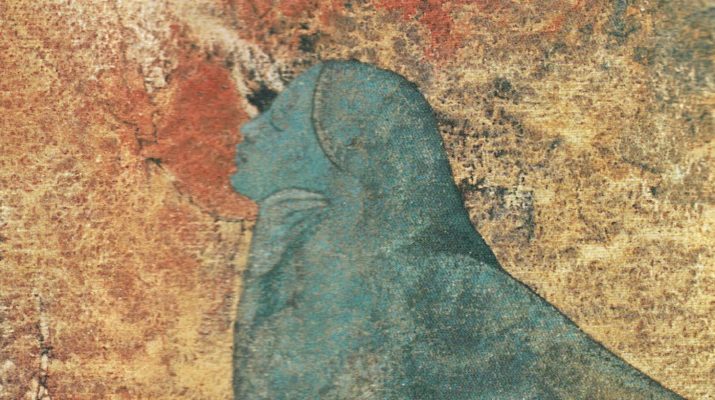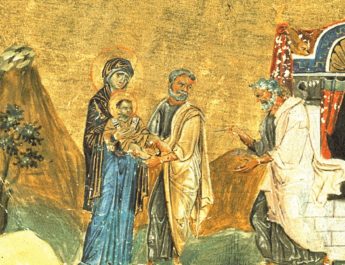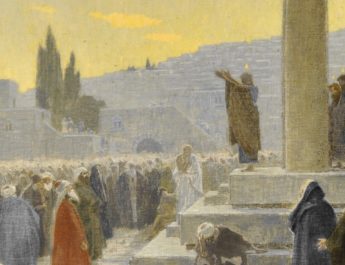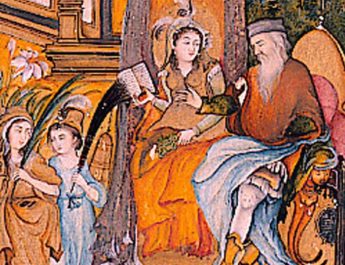BibleHub
2 SarahA conceivedB and boreC AbrahamD
Notes on verse 2a
A “Sarah” = Sarah. From the same as Saray (princess, mistress, noble lady, queen); from sar (chief, ruler, captain, official, prince). This is Sarah, meaning princess.
B “conceived” = harah. This is to conceive or be pregnant – it can be literal or figurative.
C “bore” = yalad. This is to bear or bring forth. It can mean to act as midwife or to show one’s lineage. This is often used for birth or begetting.
D “Abraham” = Abraham. From the same as Abiram (exalted father, a high father – lofty) {from ab (father literal or figurative) + rum (rise, bring up, being high, extol, exalt, haughty; to raise in a literal or figurative sense)}. This is Abraham, father of many nations or father of a multitude.
a sonE in his old age,F at the timeG of which GodH had spokenI to him.
Notes on verse 2b
E “son” = ben. From banah (to build or obtain children). This is son, age, child. It is son in a literal or figurative sense.
F “old age” = zaqun. 4x in OT– all in Genesis. From zaqen (to be old, grow old, old man); from the same as zaqan (beard or chin – the beard represents old age). This is old age.
G “time” = moed. From yaad (to appoint, assemble or gather selves, agree). This is a meeting, assembly, fixed time. It can be used for a festival or feast. It can also refer to a meeting place.
H “God” = Elohim.
I “spoken” = dabar. This is generally to speak, answer, declare, or command. It might mean to arrange and so to speak in a figurative sense as arranging words.
8 The childJ grew,K and was weaned;L
Notes on verse 8a
J “child” = yeled. Related to “bore” in v2. From yalad (see note C above). This is something born – so, offspring, youth, fruit. It is the same word used in Isaiah 9:6 “for a child will be born to us.”
K “grew” = gadal. This is to grow up, become great, become wealthy – to advance. The root meaning may be to twist in the sense of the process of growing.
L “weaned” = gamal. This is how one deals with someone whether positively or negatively – so to reward, requite. It can also mean to wean or the work that goes into something ripening.
and Abraham madeM a greatN feastO on the dayP that IsaacQ was weaned.
Notes on verse 8b
M “made” = asah. This is to make, do, act, appoint, become in many senses.
N “great” = gadol. Related to “grew” in v8. From gadal (see note K above). This is great, high, bigger, noble, old, marvelous. It can also refer to someone who is powerful or distinguished.
O “feast” = mishteh. From shathah (to drink literally or figuratively; a drinker). This is drink or the act of drinking. So it is a feast or banquet, as occasions with drinking.
P “day” = yom. Root may mean being hot. This is the day in a literal or figurative sense. It can also mean birth, age, daylight, continually or other references to time.
Q “Isaac” = Yitschaq. From tsachaq (to laugh, mock, play, make sport; this is laughing out loud whether in joy or in a scornful way). This is Isaac, meaning “he laughs.”
9 But Sarah sawR the son of HagarS the Egyptian,T whom she had borne to Abraham, playingU with her son Isaac.
Notes on verse 9
R “saw” = raah. This is to see in a literal or figurative sense so stare, advise, think, view.
S “Hagar” = Hagar. 12x in OT. Perhaps from hagar (fleeing; a stranger or foreigner) OR from ha (the) + garar (to drag out or away) OR from Persian/Greek aggareuo (to press into service). This is Hagar, a name meaning “flight,” “to be dragged off,” “pressed into service,” “sojourner,” “foreigner,” or “messenger.” See https://www.abarim-publications.com/Meaning/Hagar.html#.Xh-BtUdKhPY and https://en.wiktionary.org/wiki/Hagar
T “Egyptian” = Mitsri. From the same as mitsrayim (Egypt); perhaps from matsor (besieged or fortified place, bulwark, entrenchment; something hemmed in; a siege or distress or fastness); from tsur (to confine, besiege, to cramp). This is Egyptian.
U “playing” = tsachaq. Related to “Isaac” in v8. 13x in OT. See note Q above.
10 So she said to Abraham, “Cast outV this slave womanW with her son; for the son of this slave woman shall not inheritX along with my son Isaac.”
Notes on verse 10
V “cast out” = garash. This is to cast out or expel. It can be to exile someone or to divorce them.
W “slave woman” = amah. This is female servant or slave, handmaid.
X “inherit” = yarash. This is inheriting or dispossessing. It refers to occupying or colonizing – taking territory by driving out the previous inhabitants and living there instead of them. By implication, it can mean to seize or rob, to expel, ruin, or impoverish.
11 The matterY was veryZ distressingAA toBB Abraham on account of his son.
Notes on verse 11
Y “matter” = dabar. Related to “spoken” in v2. From dabar (see note I above). This is speech, a word, a matter, an affair, charge, command, message, promise, purpose, report, request. It is a word, which implies things that are spoken of in a wide sense.
Z “very” = meod. Perhaps from the same as uwd (firebrand, a poker). This is very, greatly, exceedingly. It can also mean vehemence, force, abundance.
AA “was…distressing” = ra’a’. This is to be evil, bad, afflict. Properly, it means to spoil – to destroy by breaking into pieces. Figuratively, it is to cause something to be worthless. It is bad in a physical, social, or moral sense – something that displeases, does harm or mischief, punishes or vexes.
BB “to” = ayin. Literally, “in the sight of.” This is eye in a literal or figurative sense so eye, appearance, favor, or a fountain (the eye of the landscape).
12 But God said to Abraham, “Do not be distressedCC because of the boyDD and because of your slave woman;EE whatever Sarah says to you, do as she tellsFF you,
Notes on verse 12a
CC {untranslated} = ayin. Same as “to” in v11. See note BB above.
DD “boy” = naar. May be from na’ar (to shake, toss up and down, tumble around). This is a child or a servant. It is a child in their active years so they could be aged anywhere from infancy to adolescence.
EE {untranslated} = kol. From kalal (to complete). This is all or every.
FF “do as she tells” = shama + qol. Literally, “listen to her voice.” Shama is to hear, call, consent, or consider. It implies listening intelligently, giving attention, and, because of these two factors, obedience and action are often implied. Qol is a sound, used often for human voices. Also used when God speaks or angels, animals or instruments. It can be a cry or a noise, thunder or earthquakes and so on.
for it is through Isaac that offspringGG shall be namedHH for you. 13 As for the son of the slave woman, I will makeII a nationJJ of him also, because he is your offspring.”
Notes on verses 12b-13
GG “offspring” = zera. From zara (to sow or scatter seed; conceive or yield). This is seed or sowing. It can, thus, mean a fruit, plant, sowing time, child, offspring, or posterity.
HH “named” = qara. This is to call or call out – to call someone by name. Also used more broadly for calling forth.
II “make” = sim. This is to put or place in a literal or figurative sense. It can be appoint, care, change, make, and may other things.
JJ “nation” = goy. From the same root as gevah (the back, person, or body); related to gev (among); related to gaah (to rise up). This is nation or people. Often used to refer to Gentiles or foreign nations. It can also be used figuratively for a group of animals. This is where the Yiddish “goy” comes from.
14 So Abraham rose earlyKK in the morning,LL and tookMM breadNN
Notes on verse 14a
KK “rose early” = shakam. This is leaning one’s shoulder into a burden or load, whether a person or an animal. Thus, it meant starting or rising early.
LL “morning” = boqer. From baqar (to seek, plow, break forth, admire, care for). This refers to the break of day. So it is dawn, early, morning, or morrow.
MM “took” = laqach. This is to take, accept, carry away, receive. It can also have the sense of take a wife or take in marriage.
NN “bread” = lechem. From lacham (to eat, feed on). This is bread, food, loaf. It can refer to food more generally for people or for animals.
and a skinOO of water,PP and gaveQQ it to Hagar, puttingRR it on her shoulder,SS along with the child, and sent her away.TT
Notes on verse 14b
OO “skin” = chemeth. 5x in OT. Perhaps from the same as chomah (a wall for protection); from the same as cham (father-in-law – one’s husband’s father; perhaps from a root meaning to join). This is a waterskin or bottle.
PP “water” = mayim. This is water, waters, or waterway in a general sense. Figuratively, it can also mean juice, urine, or semen.
QQ “gave” = natan. This is to give, put, set, offer. It is to give literally or figuratively.
RR “putting” = sim. Same as “make” in v13. See note II above.
SS “shoulder” = shekem. Related to “rose early” in v14. Perhaps from shakam (see note KK above). This is shoulder, neck, or some other place that bears burdens. Figuratively, it can refer to the spur of a hill, or one’s allotted portion.
TT “sent…away” = shalach. This is to send out, away, send for, forsake. It can also mean to divorce or set a slave free.
And she departed,UU and wanderedVV about in the wildernessWW of Beer-sheba.XX
Notes on verse 14c
UU “departed” = halak. This is go, come, walk. It is walk literally and figuratively and includes people and animals. It can be used figuratively for one’s moral life – how we walk according to God’s way or against it. It can also refer to the walk of life as in the course one’s life takes, the choices we make, etc.
VV “wandered” = taah. This is to wander, deceive, seduce, vacillate. It is to stray in a literal or figurative sense.
WW “wilderness” = midbar. Related to “spoken” in v2 & “matter” in v11. From dabar (see note I above). This is mouth or speech. It can also be desert or wilderness. Additionally, it can be used for a pasture to which one drives cattle.
XX “Beer-sheba” = Beerah shaba. From beer (a well or pit); {from baar (to make plain; to dig; can also mean to engrave or figuratively to explain)} + perhaps from shaba (to swear, curse, vow, make a covenant; properly, to be complete; this is to seven oneself – as in affirming something so strongly it is as though it were said seven times) {perhaps from sheba (seven – the number of perfection/sacred fullness)}. This is Beersheba – meaning either “well of seven” or “well of an oath.”
15 When the water in the skin was gone,YY she castZZ the child under oneAAA of the bushes.BBB
Notes on verse 15
YY “was gone” = kalah. This is to end, be finished, complete, prepare, consume, spent, or completely destroyed.
ZZ “cast” = shalak. This is to throw, fling, or hurl. It can also be to throw away in a literal or figurative sense.
AAA “one” = echad. Perhaps from achad (to unify, continue on a path; figuratively, to gather one’s thoughts). This is the number one, first, united. It can also be alone, altogether, a certain, a few.
BBB “bushes” = siach. 4x in OT. Perhaps from siach (to muse, meditate, complain, sing, sigh, speak, or utter); perhaps from siach (musing, meditation, communication, babbling, prayer, contemplation). This is a bush, shrub or plant. Perhaps it is a shoot as though it was expressed by a plant.
16 Then she wentCCC and sat downDDD oppositeEEE him a good way off, about the distanceFFF of a bowshot;GGG
Notes on verse 16a
CCC “went” = halak. Same as “departed” in v14. See note UU above.
DDD “sat down” = yashab. This is to sit and so to remain and so to dwell. It is sitting for any reason – as a judge, in order to ambush, or just sitting quietly. Causatively, this can mean settling or marrying. This can also mean continue, endure, or establish.
EEE “opposite” = neged. From nagad (to declare, make conspicuous, stand in front, manifest, predict, explain). This is in front of, opposite to. It can refer to a counterpart or partner, one corresponding to or in the sight of.
FFF “distance” = rachaq. This is to widen, become distant, cast, or remove. It can be in a literal or figurative sense.
GGG “bowshot” = tachah + qesheth. Tachah is 1x in OT. This is to shoot as one who shoots an arrow. Qesheth is perhaps from qush (to set a trap, lure, ensnare) OR from qashah (to be fierce, cruel, dense, tough, severe). This is a bow, arrow, or archer. Bow can be used figuratively for strength.
for she said, “Do not let me lookHHH on the deathIII of the child.” And as she sat opposite him, she liftedJJJ up her voiceKKK and wept.LLL
Notes on verse 16b
HHH “look” = raah. Same as “saw” in v9. See note R above.
III “death” = mavet. From muth (to die in a literal or figurative sense). This can be death, deadliness, the dead, or the place where the dead go. It can be used figuratively for pestilence or ruin.
JJJ “lifted” = nasa. This is to lift in a broad sense, literally and figuratively. So it could be to carry, take, or arise. It could also be bring forth, advance, accept.
KKK “voice” = qol. Same as “do as she tells” in v12. See note FF above.
LLL “wept” = bakah. This is to weep, complain, or lament.
17 And God heardMMM the voice of the boy; and the angelNNN of God calledOOO to Hagar from heaven,PPP and said to her, “What troubles you, Hagar? Do not be afraid;QQQ for God has heard the voice of the boy where he is.
Notes on verse 17
MMM “heard” = shama. Same as “do as she tells” in v12. See note FF above.
NNN “angel” = malak. This is a messenger, an angel, or a deputy of some kind. Can be used for human messengers literally or for prophets, priests, or teachers as messengers of God. Also used for supernatural messengers i.e. angels.
OOO “called” = qara. Same as “named” in v12. See note HH above.
PPP “heaven” = shamayim. Root may mean being lofty. This is sky, the air, or heaven. It is in a dual noun form so this might refer to the part of the sky where the clouds move on the one hand and the part beyond that where the sun, moon, and stars are on the other hand.
QQQ “be afraid” = yare. This is to fear, be afraid, dreadful. It can also refer to fearful reverence – to fear in a moral sense is to say to revere, respect.
18 Come,RRR lift up the boy and hold him fastSSS with your hand,TTT for I will make a great nation of him.”
Notes on verse 18
RRR “come” = qum. To arise, stand, accomplish, establish, abide. This is rising as in rising against, getting up after being sick or asleep, arising from one state to another, becoming powerful, or rising for action. It can also be standing in a figurative sense.
SSS “hold…fast” = chazaq. This is to strengthen, seize, be courageous, repair, bind, heal, conquer, harden.
TTT “hand” = yad. This is hand, ability, power. Hand in a literal sense, but also what one can do or the means by which one does it.
19 Then God openedUUU her eyesVVV and she saw a wellWWW of water. She went, and filledXXX the skin with water, and gave the boy a drink.YYY
Notes on verse 19
UUU “opened” = paqach. This is open, as opening one’s senses, particularly eyes. So, figuratively this can refer to being watchful.
VVV “eyes” = ayin. Same as “to” in v11. See note BB above.
WWW “well” = beer. Related to “Beer-sheba” in v14. See note XX above.
XXX “filled” = male. This is fill, satisfy, replenish, accomplish, fulfill, confirm, or consecrate. It is fill in a literal or figurative sense.
YYY “gave…a drink” = shaqah. This is to give water to, to cause to drink – to irrigate, drown. It can be used for watering plants or giving water to flocks.
20 God wasZZZ with the boy, and he grew up; he livedAAAA in the wilderness, and becameBBBB an expertCCCC with the bow.DDDD
Notes on verse 20
ZZZ “was” = hayah. This is to be or become, to happen.
AAAA “lived” = yashab. Same as “sat down” in v16. See note DDD above.
BBBB “became” = hayah. Same as “was” in v20. See note ZZZ above.
CCCC “expert” = rabah. This is increasing in any aspect whether quantity, authority, size, quality, greatness, etc.
DDDD “bow” = qashshath. Related to “bowshot” in v16. 1x in OT. From the same as qesheth (see note GGG above). This is archer or bow.
21 He lived in the wilderness of Paran;EEEE and his motherFFFF gotGGGG a wife for him from the landHHHH of Egypt.IIII
Notes on verse 21
EEEE “Paran” = Paran. 11x in OT. From the same as porah (a branch or spring; properly, ornamentation); perhaps from pa’ar (to beautify or adorn, to gleam; can refer to showing honor or glorifying someone; also to boast or to shake a tree for harvest). This is Paran, perhaps meaning ornamental.
FFFF “mother” = em. This is a mother as binding a family together or a breeding female animal. It could be mother in a literal or figurative sense.
GGGG “got” = laqach. Same as “took” in v14. See note MM above.
HHHH “land” = erets. Root may mean to be firm. This is earth, ground, field land, or country.
IIII “Egypt” = Mitsrayim. Related to “Egyptian” in v9. See note T above.
Image credit: “Hagar Speaking with the Angel” by Frank Wesley.




